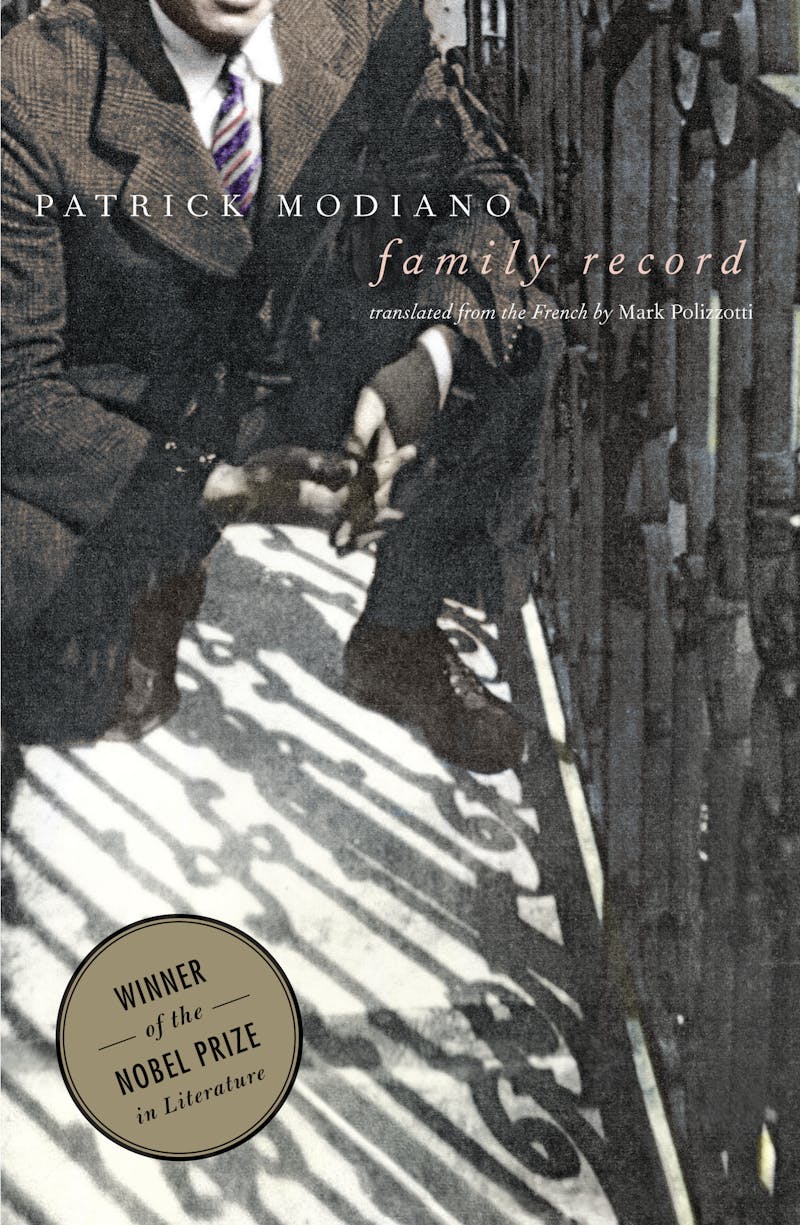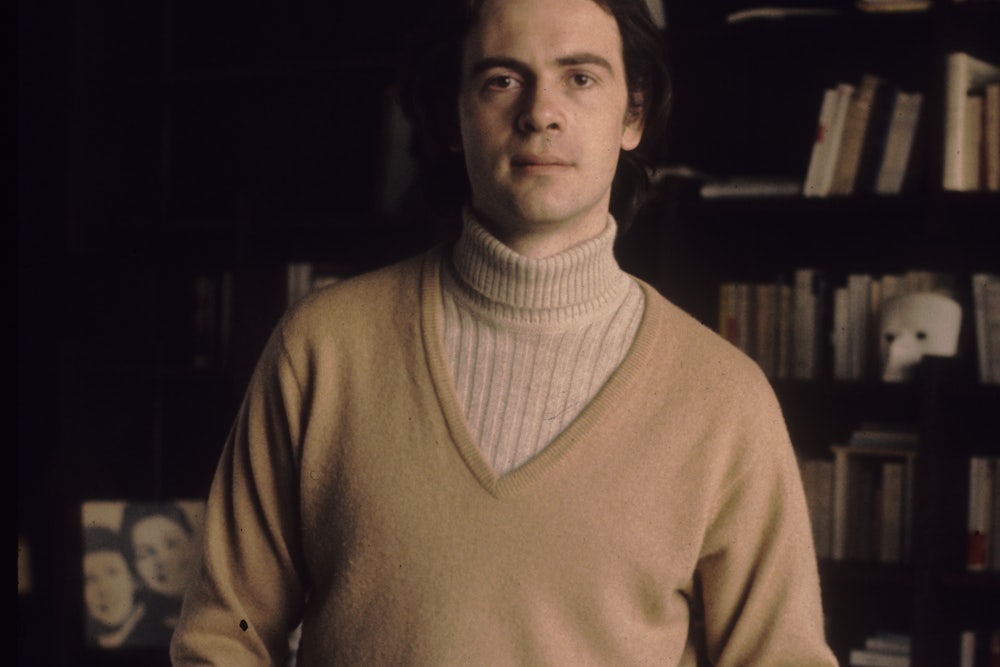Whenever I catch myself proselytizing about the work of Patrick Modiano—which happens, it turns out, quite often—I realize I sound, like every evangelist, a little crazy. I’ll say, “His books are mysteries without solutions!” or “They’re stories where nothing really happens!” and mean this as an endorsement.
Modiano, who received the Nobel Prize in Literature in 2014, has written dozens of books, and though I’ve read only part of his oeuvre (translators: Hurry up), I feel comfortable asserting that they’re all essentially the same. Again, I mean this as an endorsement. Perhaps it’s useful to think of them as a single body of work rather than discrete volumes; variations on a theme, a lifelong endeavor.

The typical Modiano work—speaking of both his novels and nonfiction—features a strangely passive character having some kind of misadventure. They might be struck by a car, but it’s more likely to be some quotidian thing, like running across someone they’ve not seen in years. These characters amble about (usually in Paris, where the author himself lives), comparing the contemporary streetscape to one long vanished. They congregate in unremarkable restaurants and strike up conversations with odd people. Motifs recur—telephone numbers, plane trees, garages, films, civil paperwork like birth records or marriage certificates—and their repetition makes them seem meaningful.
Modiano was born in 1945, just before the end of the Second World War. That conflict is his abiding concern, even if his work doesn’t adhere to template or convention. He’s not interested in politics or bloodshed, heroism or horror. The stories posit mysteries with low stakes (What became of my address book?) or something closer to what you’d find in crime fiction (Is that person living under an assumed name?). There’s a suggestion of menace that never fully comes into focus: That address book contained the name of a person who vanished; perhaps the victim of a crime, perhaps the perpetrator of one, or maybe just one of the millions who died or were uprooted in 1940s Europe.
These mysteries are insoluble in precisely the same way that the war was inexplicable. We know what happened, historically speaking, but Modiano is interested in what the official record doesn’t reflect: the trespasses committed when life as usual breaks down. On the fringes of his stories are petty criminals, profiteers, willing collaborators, the luckless, and the stateless. What did they do during the war, and what happened to them afterward? These figures make you want to know how people could wage war at all, and how they could survive it, but Modiano allows only that life contains far more questions than it does answers.
Family Record, the latest of the author’s books to appear in English (in a translation by Mark Polizzotti) predates his most recent work, the novel Sleep of Memory, by 40 years. It was shocking to realize that, at only 32, Modiano had already found the subjects and themes that would engage him across decades.
You can’t quite call Family Record, which is billed as a mix of fact and fiction, a memoir, but you can’t quite talk about it as a novel. This feels like a feint (an oh-so-French one, while we’re at it) but also describes virtually all the author’s work. Even his ostensibly nonfiction Dora Bruder, an investigation into the life of a schoolgirl killed in the Holocaust, reads like a hybrid of journalism, memoir, and fiction. The text includes photographs, but part of me still wonders whether Modiano made the whole thing up. I would not like it any less if it turned out that he had.
Family Record is organized in vignettes. In the first, it’s the night before the birth of the author’s daughter, Zénaïde, and he’s in a restaurant—“one of those places you find yourself in when something important has happened, a place you would never go under normal circumstances”—and overhears another diner’s surname, Koromindé, when he’s summoned to the telephone. It turns out Jean Koromindé was a friend of the author’s father. Modiano tells us he hasn’t seen his father in 20 years.
The two chat, and the next day Koromindé accompanies Modiano to the town hall, to register his daughter’s birth. “One day, in twenty years’ time, if she was curious enough to look up this registration—but why would she?—Zénaïde, seeing this signature, would wonder who this Jean Koromindé could have been.” This one anecdote contains so many of Modiano’s hobbyhorses (the two men go to a garage to fix Koromindé’s car, and he recounts having once accompanied Modiano’s father on an errand to fix his own car) that it’s impossible for me to read quite as fact, even if I have no real reason to doubt its veracity.
As I am only able to read Modiano’s work in translation, I don’t feel I can accurately assess his prose. As rendered in English, anyway, it is efficient, direct, unfussy but not without the occasional flight of fancy. It is easy to read his words, which is funny because it can be so confusing to read his books. Still, I relish how he’ll begin a story as though he’s picking up a subject that’s been discussed before: “Yes, of course, in that little cinema in the Ternes neighborhood, the bonus feature they were showing was Captain Van Mers.” I like the slippage between present and past tense that signals an authorial digression; I admire the economy with which the author can leap through years or across the globe.
Maybe the stories Modiano tells in Family Record (traveling with his wife to find his own birth certificate; sitting at a café next to a man who slumps over dead while drinking a grenadine) are true. Maybe not. Regardless, this early work is a key to the author’s larger project, a kind of cheat sheet. And if it turns out that Modiano is a predecessor to Ben Lerner, Sheila Heti, Karl Ove Knausgaard, and every writer who crafts fiction from the facts of their own lives, what have we really learned?
In Family Record, Modiano writes of his youth in Switzerland, where he became a fan of a particular radio program. One of the hosts seemed familiar to him:
Robert Gerbaud reminded me of someone. I stretched out on the bed and stared at the wall in front of me. A face appeared amid the flowers of the wallpaper. A man’s face. The face that emerged from the wall, plain to see, belonged to D., the most heinous figure in Occupied Paris; D., whom I knew to have hidden out in Madrid, then Switzerland, and was living under an assumed name in Geneva, having found work on the radio. But of course: Robert Gerbaud—it was he. Once more, the past engulfed me.
This D. worked for the Jewish Affairs Police and almost
arrested the narrator’s (or Modiano’s?) father. Modiano arranges a meeting with
the man. He does not want to kill him, only confront him with what he’s done.
But Modiano loses faith that Gerbaud is in fact D., and does not keep the
appointment. Anyway, justice would be impossible. “It would mean nothing to him
anymore,” he writes. “Memory itself is corroded by acid, and of all those cries of suffering
and horrified faces from the past, only echoes remain, growing fainter and
fainter, vague outlines.”
In Modiano’s books, the hoped-for meeting never takes place,
the secret identity is never revealed, the missing item is never recovered—none
of the plots’ most pressing questions are ever answered. This is
destabilizing; some readers might find it deeply irritating. In his simple,
straightforward prose, Modiano doesn’t give us the story, only its “echoes, growing
fainter and fainter, vague outlines.” Somehow, strangely, that is more than
enough.
